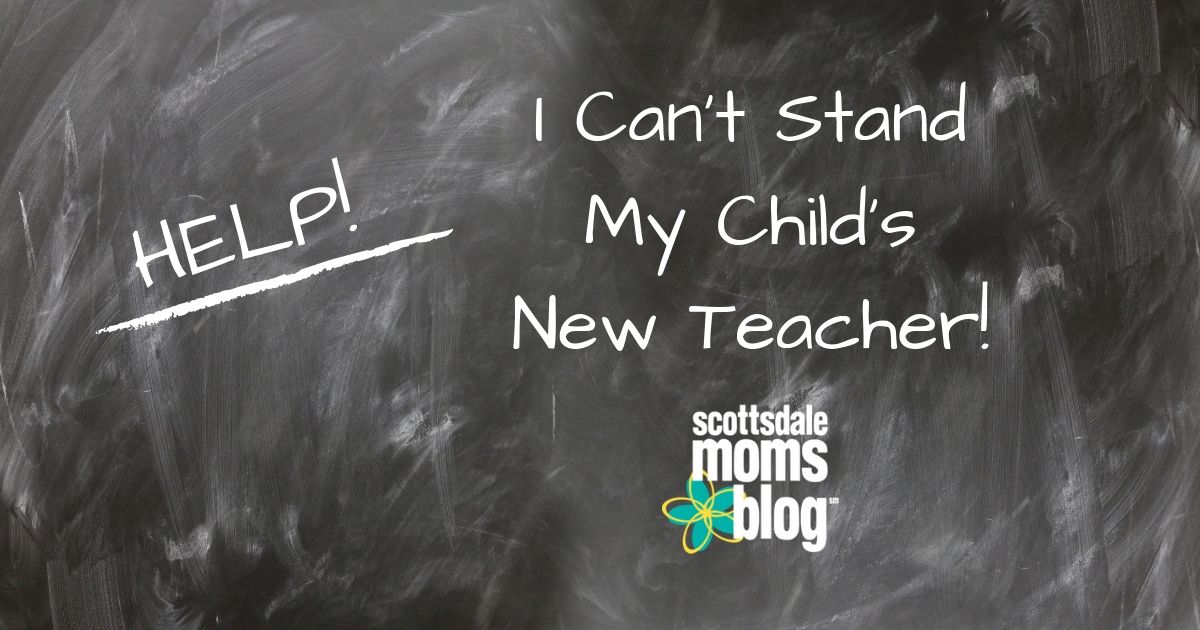Whether you’ve heard rumors or your child’s new teacher just isn’t quite as warm and fuzzy as you expected, going into a new school year with reservations can create tension for everyone.
Whether you like it or not, your kiddo probably spends more time with their teacher than they do with you and your spouse during the school year.
 So, what should you do if you can’t stand your child’s new teacher?!
So, what should you do if you can’t stand your child’s new teacher?!
- Consider why you feel that way. Did you start the school year with gossip influencing your opinion of the teacher? Give them a chance to prove it wrong. Your child may have a wonderful experience. Are they less welcoming than you expected? Is the classroom a disorganized mess? Keep in mind, it can be very beneficial for children to learn to adapt to different personalities and environments.
- Ask questions about your child’s day. Sometimes when a student complains about their teacher, there’s something deeper gong on. Is your child bored? Is the teacher mean? Do they call on your child too often? Is there a little too much chaos in the classroom? Some of these situations will naturally resolve as the weeks continue. Others may require you to get involved.
- Listen to your child. Are they complaining the teacher is tough? Remember how difficult it is to go back to work after a long vacation. Your child just had two months to lounge by the pool and watch TV. There’s definitely an adjustment period when a new school year starts. However, if your child feels specifically targeted, you’ll need to ask more questions to figure out what’s going on.
- Ask yourself: what else could this mean? There are two sides to every story. If your child says their teacher yells all day, maybe the classroom microphone is turned up too loud. Maybe the kids are so rowdy that the teacher has to raise their voice to be heard. Or, maybe the teacher really is “a yeller.”
- Help your child navigate new situations. Even the best teachers will clash with some parents or students. Talk to your child about what’s going wrong in the classroom and work with them to see how they can help improve the situation. For example, if your child feels like their teacher is annoyed with them for asking too many questions, encourage them to use their resources (textbook, peers, etc.) before raising their hand.
- Be discrete. The last thing your child needs is to feel torn between their parents and their teacher. These are the adults who should have the best intentions for them. If your child starts to realize you can’t stand their teacher, it puts them in an uncomfortable situation. A young student may share that information with their teacher, creating a bigger issue. Older students may stop sharing information about their day because they don’t want to hear you complain about their teacher.
- Be patient. Remember, teachers are people, too. Everyone makes mistakes. Everyone has a hard day. Everyone is learning and growing each day.
But, what if things get really bad?
- Talk to the teacher. If there’s something specific that’s upsetting you or your child, consider talking to the teacher. Approach the issue with care by first asking to schedule a time to talk. You wouldn’t want your boss to stop you on your way out of the office to reprimand you; similarly, teachers deserve the respect of planning a conversation that fits in their schedule. When you meet with the teacher, try to stay on point and focus on the main issue. It may help to write down your thoughts in advance and reference them if you feel nervous during the conversation.
- Schedule a classroom observation. If the teacher doesn’t recognize the issue you brought to their attention, ask if you can observe the classroom. You might be surprised by what you see.
- Talk with the principal. Consider the consequences of taking this major step. A good principal will coach their teaching staff to help them improve. This probably means your child’s teacher will know you “told on them.” A good teacher won’t hold this against your child, but it could make future conversations between you and the teacher uncomfortable. If you decide to take this step, provide the principal with as much information as possible before the meeting so they can prepare. During the meeting, stick to the facts and be objective. Try to understand the situation from the teacher’s perspective.
- Consider changing classrooms. If you feel your child is in mental or physical danger, it may be time to change classrooms or schools. This should be a last resort, since it will require a lot of adjustment and catching up.
One of the wonderful things about people is each one of us is just a little different from the next. Unfortunately, that sometimes leads to tension or misunderstandings. Just like you may not like every coworker you encounter, from time to time there’s bound to be a teacher you can’t stand, too.
Sometimes it’s hard to let go of our children and trust that someone else will take good care of them like we do. At the end of the day, you don’t have to like a teacher to respect that they have your child’s best interests in mind. If your child is learning and thriving and is having a positive school experience, it may be time to reconsider your opinions of the teacher you can’t stand.

















